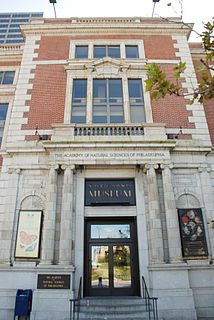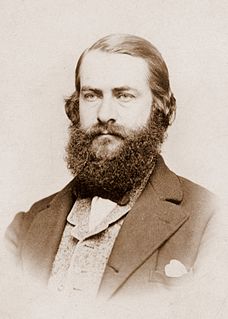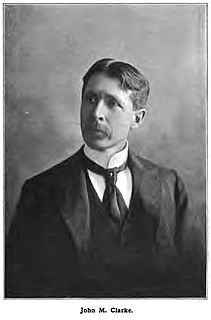Related Research Articles

The American Philosophical Society (APS), founded in 1743 and located in Philadelphia, is an eminent scholarly organization of international reputation that promotes useful knowledge in the sciences and humanities through excellence in scholarly research, professional meetings, publications, library resources, and community outreach. Considered the first learned society in the United States, it has played an important role in American cultural and intellectual life for over 270 years.

The Wollaston Medal is a scientific award for geology, the highest award granted by the Geological Society of London.

William Morton Wheeler was an American entomologist, myrmecologist and Harvard professor.

Edward Drinker Cope was an American paleontologist and comparative anatomist, as well as a noted herpetologist and ichthyologist. He was a founder of the Neo-Lamarckism school of thought. Born to a wealthy Quaker family, Cope distinguished himself as a child prodigy interested in science; he published his first scientific paper at the age of 19. Though his father tried to raise Cope as a gentleman farmer, he eventually acquiesced to his son's scientific aspirations. Cope married his cousin and had one child; the family moved from Philadelphia to Haddonfield, New Jersey, although Cope would maintain a residence and museum in Philadelphia in his later years.

The Royal Society of Edinburgh is Scotland's national academy of science and letters. It is a registered charity, operating on a wholly independent and non-party-political basis and providing public benefit throughout Scotland. It was established in 1783. As of 2017, it has more than 1,660 Fellows.

The Academy of Natural Sciences of Drexel University, formerly the Academy of Natural Sciences of Philadelphia, is the oldest natural science research institution and museum in the Americas. It was founded in 1812, by many of the leading naturalists of the young American republic with an expressed mission of "the encouragement and cultivation of the sciences". For over two centuries of continuous operations, the Academy has sponsored expeditions, conducted original environmental and systematics research, and amassed natural history collections containing more than 17 million specimens. The Academy also has a long tradition of public exhibits and educational programs for both schools and the general public.

Joseph Mellick Leidy was an American paleontologist, parasitologist, geologist, and anatomist.

Merritt Lyndon Fernald was an American botanist. He was a respected scholar of the taxonomy and phytogeography of the vascular plant flora of temperate eastern North America. During his career, Fernald published more than 850 scientific papers and wrote and edited the seventh and eighth editions of Gray's Manual of Botany. Fernald coauthored the book Edible Wild Plants of Eastern North America in 1919-1920 with Alfred Kinsey, which was published in 1943.
The Murchison Medal is an academic award established by Roderick Murchison, who died in 1871. First awarded in 1873, it is normally given to people who have made a significant contribution to geology by means of a substantial body of research and for contributions to 'hard' rock studies. One of the closing public acts of Murchison’s life was the founding of a chair of geology and mineralogy in the University of Edinburgh. Under his will there was established the Murchison Medal and geological fund to be awarded annually by the council of the Geological Society of London.

The Clarke Medal is awarded by the Royal Society of New South Wales, the oldest learned society in Australia and in the Southern Hemisphere, for distinguished work in the Natural sciences.

Henry Augustus Pilsbry was an American biologist, malacologist and carcinologist, among other areas of study. He was a dominant presence in many fields of invertebrate taxonomy for the better part of a century. For much of his career, his authority with respect to the classification of certain substantial groups of organisms was unchallenged: barnacles, chitons, North American terrestrial mollusks, and others.
The Murchison Fund is an award given by the Geological Society of London to researchers under the age of 40 who have contributed substantially to the study of hard rock and tectonic geology. It is named in honour of Prof. Roderick Impey Murchison.
Chancey Juday together with G. Evelyn Hutchinson, and his close collaborator, Edward A. Birge were pioneers of North American limnology. Birge and Juday founded an influential school of limnology on Lake Mendota at the University of Wisconsin. Edward Birge hired Chancey Juday through this program to help him take samples of lakes in Wisconsin. Their main sampling took place on Lake Mendota. The two, Juday and Birge, studied dissolved oxygen and temperature, leading future limnologists to a better understanding of stratification.

Carl Leavitt Hubbs was an American ichthyologist.
The Mary Clark Thompson Medal is awarded by the U.S. National Academy of Sciences "for most important service to geology and paleontology." Named after Mary Clark Thompson and first awarded in 1921, it is presented every three years together with a $15,000 prize.

John Mason Clarke was an American teacher, geologist and paleontologist.
The Leidy Award is a medal and prize presented by the Academy of Natural Sciences of Drexel University, Philadelphia, Pennsylvania, USA. It was named after US palaeontologist Joseph Leidy. The award was established in 1923 to recognize excellence in "publications, explorations, discoveries or research in the natural sciences", and was intended to be presented every three years. The award consists of a rectangular bronze medal and an honorarium which was initially $5000.
References
- ↑ "The Four Awards Bestowed by The Academy of Natural Sciences and Their Recipients". Proceedings of the Academy of Natural Sciences of Philadelphia. The Academy of Natural Sciences of Philadelphia. 156 (1): 403–404. June 2007. doi:10.1635/0097-3157(2007)156[403:TFABBT]2.0.CO;2.